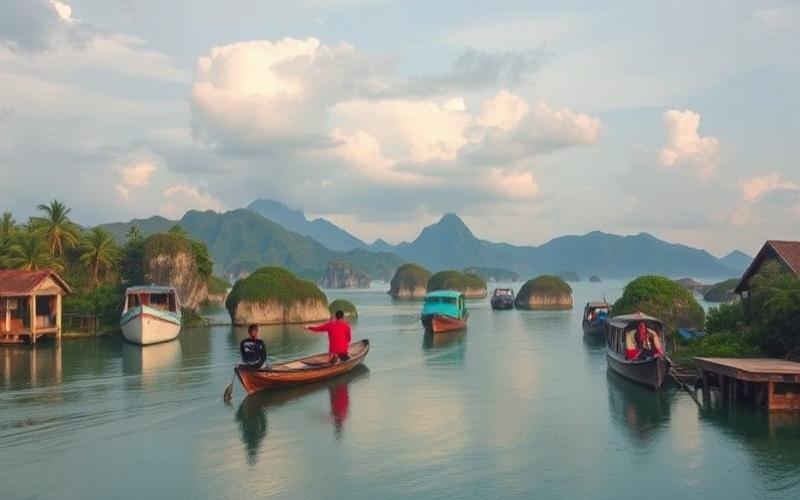
 Published on and written by Cyril Jarnias
Published on and written by Cyril Jarnias
Relocating to Indonesia as an expatriate promises an adventure rich with cultural and professional discoveries. This essential guide is designed to walk you through the nuances of life in Indonesia, from fascinating traditions to administrative formalities.
Imagine yourself enjoying local cuisine while exploring the stunning natural beauty of this unique archipelago.
However, before you can immerse yourself in Jakarta’s bustling energy or Bali’s tranquility, it’s crucial to understand the key elements for a successful relocation, such as obtaining visas, choosing suitable housing, and integrating into this society rich with diversity.
Preparing Your Move to Indonesia: Practical Tips
Administrative Procedures for Obtaining a Visa
- Passport with validity exceeding 6 months from entry date and blank pages required.
- Obtain a local sponsor (employer, family member, or school/university).
- Apply for VITAS (Limited Stay Visa) at the Indonesian embassy or consulate before departure. Required documents: passport, application form, photos, sponsor letter, proof of travel, medical certificate.
- Once in Indonesia, convert VITAS to KITAS (Temporary Stay Permit) at the local immigration office.
- For short stays or non-professional visits, possibility of visa on arrival (VOA) or 30-day exemption, renewable once.
- Retirees (55+) and digital nomads have specific procedures.
- Registration with the French consulate recommended.
Required and Recommended Vaccinations
| Vaccine | Status | Notes |
|---|---|---|
| Yellow Fever | Required* | If previous stay in endemic area |
| DTP (Diphtheria-Tetanus-Polio) | Recommended | Update recommended |
| Hepatitis A | Recommended | High prevalence |
| Hepatitis B | Recommended | Depending on duration and lifestyle |
| Typhoid | Recommended | For long stays or rural areas |
| Rabies | Recommended | Extended or rural stays |
| Japanese Encephalitis | Recommended | If prolonged rural stay |
| BCG (Tuberculosis) | Recommended | If contact with local population |
*Required only for travelers coming from countries where the disease is present.
Choosing the Right Time to Move
- Avoid the rainy season (monsoon): generally from October/November to March/April, peaking from December to February depending on the region.
- Dry season (April/May to September/October): most pleasant time to move, drier climate and easier travel.
- Archipelago regions may have local variations (e.g., Sumatra, Borneo, Papua).
Tips for Finding Housing Before Arrival
- Check expatriate Facebook groups and specialized forums for recommendations and housing listings.
- Use local real estate platforms (Rumah123, OLX, Expat.com).
- Contact real estate agencies specializing in expatriates or trusted local contacts.
- Arrange temporary accommodation (hotel, guesthouse, Airbnb) for the first days to visit properties before commitment.
- Request photos, videos and verify location via Google Maps.
- Be wary of upfront payments without contract or guarantee.
Opening a Local Bank Account
- Present KITAS (or long-term visa), passport, and sometimes an employer letter.
- Visit a bank branch (BNI, Mandiri, BCA, CIMB Niaga, etc.).
- Proof of address or rental contract sometimes required.
- Some institutions offer specific accounts for expatriates.
- Processing time: from a few hours to several days.
- Prepare minimum amount to activate account (varies by bank).
Required Health Insurance and Local Options
- International health insurance strongly recommended for coverage outside Indonesia (repatriation, major medical care).
- Option to subscribe to local insurance (Sinarmas, AXA Mandiri, Allianz Indonesia), but coverage may be limited outside the territory.
- Verify coverage extent (approved hospitals, annual limits, exclusions).
- European Health Insurance Card not valid.
Useful Resources and Contacts for Expatriates
- Facebook Groups: “French in Bali”, “French in Indonesia”, “Expats in Jakarta”, “French-speaking Expatriates Indonesia”.
- Specialized Forums: Expat.com, Internations.org, Bali Expat Forum.
- French Embassy and Consulate: expatriate services, security, registries.
- French-speaking Associations: UFE (Union of French Abroad), Welcome for French in Indonesia.
- Mutual aid platforms for housing, employment, administrative procedures.
Important
Prepare all your documents in duplicate, anticipate administrative processing times, and keep secure digital copies of your important papers.
Good to Know:
Ensure you obtain a visa by preparing the necessary documents and get vaccinated against hepatitis A and typhoid. Joining expatriate Facebook groups can help you find housing and get advice for opening a local bank account before your arrival.
Settling In: Key Procedures Upon Arrival
Required Documents for Registration and Stay Permit (KITAS)
The KITAS (Kartu Izin Tinggal Terbatas) is essential for legal residence in Indonesia. It’s typically obtained through your employer, a specialized agency, or as an investor, retiree, or spouse.
- Valid passport (at least 18 months remaining)
- Entry visa (VITAS) issued by Indonesian embassy in your home country
- Sponsor letter (from employer or local guarantor)
- ID photos
- Certificate of domicile
- Registration with local authorities (immigration office and police station)
- Processing time: between 2 weeks and 2 months depending on category and application
Tips for Housing Search and Popular Neighborhoods
Prioritize proximity to workplace or school to avoid traffic congestion.
Recommended Neighborhoods in Jakarta:
- Kemang: international atmosphere, numerous bars and restaurants, mainly houses and residential complexes
- Kuningan: business center, apartments in modern buildings, vibrant nightlife
- Menteng: embassy district, beautiful houses and buildings
- Sudirman / SCBD / Senopati / Kebayoran Baru / Dharmawangsa: high-end apartments, nearby shopping malls
- Cipete: French community, houses and residential complexes, close to French school
- Cilandak / Pondok Indah: spacious houses, family environment, high prices
- Pakuwon: modern residences, enhanced security, premium facilities
For Bali and Lombok: prefer Sanur, Nusa Dua, or secured residences for families and expatriates. Use specialized real estate agencies and expatriate networks to find suitable housing.
Procedures for Opening a Bank Account and Main Banks
Required documents:
- Passport
- KITAS
- Certificate of domicile
- Proof of employment or income
Main banks to consider:
- Bank Central Asia (BCA)
- Bank Mandiri
- Bank Negara Indonesia (BNI)
- Bank Danamon
- Permata Bank
Prefer banks with English services and branches adapted to expatriates.
Subscribing to Essential Services: Water, Electricity, Internet
Water and Electricity:
- Public providers (PDAM for water, PLN for electricity) or included in rent (especially in apartments)
- Check service quality and availability during property visit
Internet:
- Recommended providers: IndiHome (Telkom), Biznet, First Media
- Easy subscription in urban areas, variable speeds depending on location
- For mobile: prefer Telkomsel or XL for good coverage
Tip: ask your landlord or real estate agency for installation and subscription advice.
Healthcare System and Choosing Suitable Insurance
International private hospitals in Jakarta and Bali offer quality care.
- Expatriate health insurance strongly recommended
- Prefer international contracts (CFE, April International, Allianz, AXA)
- Verify hospitalization coverage, repatriation, and access to private clinics
- Easy online subscription or through specialized brokers
- Request list of partner hospitals and clinics before choosing your insurance
Tips for Cultural Adaptation and Language Learning Resources
Participate in expatriate events and networks to facilitate your integration. Enroll in Indonesian language classes offered by language schools, associations, or local universities.
Recommended resources:
- Mobile apps (Duolingo, Babbel)
- Private or group classes (Jakarta Language Academy, Cinta Bahasa in Bali)
- French-speaking communities and Facebook groups for exchange and practice
Resources and Useful Links for Procedures
- Real estate sites: Rumah123, Lamudi, Expat.com
- Expatriate networks: Internations Jakarta, UFE Indonesia, Femmexpat
- Practical guides: ExpatDen Indonesia, Lepetitjournal Jakarta
- Administrative services: French Embassy in Jakarta, Indonesian Immigration (Ditjen Imigrasi)
- International health insurance: CFE, April International, Allianz, AXA
Key Takeaways
Prepare all your documents, prioritize neighborhoods suited to your lifestyle, choose a bank with English services, subscribe to comprehensive health insurance, and engage in local life for a successful settlement in Indonesia.
Good to Know:
To facilitate your settlement in Indonesia, start by obtaining the KITAS from local authorities, then explore neighborhoods like Kemang for housing; opt for a bank like BCA to simplify your financial procedures and prefer a provider like Telkom for Internet.
Succeeding in Integration into the Indonesian Community
Learning the Indonesian language is essential for facilitating daily communication, understanding local values, and strengthening bonds with residents. This not only helps you feel integrated but also provides access to exceptional cultural richness and better understanding of Indonesian custom subtleties. Mastering Bahasa Indonesia opens the door to authentic exchanges and fosters trust in social relationships.
Practical Tips for Engaging in Local Life:
- Participate in cultural events (festivals, religious ceremonies, traditional celebrations).
- Enroll in craft, dance, or cooking workshops to discover local practices and traditions.
- Frequent markets and popular meeting places to observe and interact with locals.
- Take part in community or association activities to contribute to local life and build connections.
Familiarizing Yourself with Indonesian Social Norms:
- Adopt a respectful attitude toward social hierarchies (acknowledging elders, authority figures, and community leaders).
- Observe and respect local religious practices, whether wearing appropriate clothing in places of worship or participating in rituals.
- Prioritize discretion and listening before expressing opinions, especially in groups or public settings.
- Learn specific politeness rules, such as greeting with both hands or smiling as a welcoming gesture.
To Overcome Culture Shock, Patience and Open-mindedness are Essential:
- Accept differences without judgment.
- Take time to observe and question local habits.
- Gradually adapt to a new pace of life and sometimes implicit social codes.
Recommendations for Expanding Your Network and Fostering Cultural Exchange:
| Group to Join | Main Advantages |
|---|---|
| Expatriate Groups | Logistical support, experience sharing |
| Local Associations | Rapid integration, cultural immersion |
| Language Clubs | Language practice, diverse encounters |
| Forums and Social Networks | Practical advice, upcoming events |
Multiplying opportunities for encounters promotes mutual enrichment: exchanging viewpoints, discovering traditions, and creating new friendships are all levers for successful integration.
Opening yourself to Indonesian language and culture means choosing a deep and respectful immersion in an exceptional multicultural universe.
Good to Know:
Learning Indonesian is essential for acceptance, while participating in local events and respecting social hierarchies enriches understanding of customs; join expatriate and local groups to exchange and build a strong network.
Types of Housing in Indonesia
- Single-family homes: Very common, even in large cities like Jakarta. Offer space, privacy, ideal for families. Available in many residential neighborhoods.
- Apartments: Mainly found in large cities (Jakarta, Surabaya, Bandung, Bali). Often located in modern buildings with services (security, pool, gym).
- Villas: Especially in Bali and some coastal cities. Often luxurious, with pool and garden.
- Kost: Rooms in guesthouses, economical solution for singles or young professionals, with shared spaces.
- Shared housing: Sharing a villa or apartment, popular among young professionals and digital nomads.
- Traditional houses: For an authentic experience, often available in Bali.
Neighborhoods Popular with Expatriates
| City | Neighborhoods Favored by Expatriates | Main Characteristics |
|---|---|---|
| Jakarta | Kemang, Menteng, Pondok Indah, Kuningan | Nightlife, international schools, security |
| Bali | Seminyak, Canggu, Ubud, Sanur | Beach proximity, cultural life, coworking |
| Surabaya | Darmo, Citraland, Pakuwon Indah | Modern neighborhoods, access to shops |
| Bandung | Dago, Setiabudi, Cihampelas | Near universities, youthful atmosphere |
Advantages and Disadvantages by Accommodation Type
| Option | Advantages | Disadvantages |
|---|---|---|
| House | Space, privacy, garden, ideal for families | Maintenance, high cost in popular areas |
| Apartment | Security, services, proximity to amenities | Sometimes limited space, condo fees |
| Villa | Luxury, comfort, pool, pleasant setting | High price, maintenance, limited availability outside Bali |
| Kost | Economical, flexible, social | Little privacy, basic facilities |
| Shared Housing | Cost sharing, social life, flexibility | Less privacy, rules to follow |
Administrative Procedures for Renting Housing
- Housing search: Online platforms, real estate agencies, expatriate groups.
- Viewing and negotiation: Always visit before signing, negotiate rent and conditions.
- Required documents:
- Valid passport
- KITAS/KITAP (residence visa for expatriates)
- Proof of income or employment contract
- Sometimes reference letter or local guarantor
- Lease signing:
- Written contract, often in Indonesian or bilingual
- Variable duration (generally 1 year, sometimes shorter or longer)
- Notary signature recommended if paying several months in advance
Security Deposits and Payment
Security deposit generally equivalent to 1 or 2 months’ rent.
Rent payment often required several months in advance.
Some landlords request cash payment or bank transfer.
Deposit refund at lease end, subject to property condition.
Rules Regarding Pets
Pet presence must be negotiated with the landlord.
Some apartments or villas accept pets, others do not.
High-end residential neighborhoods are generally more tolerant.
Laws and Local Regulations
Foreigners generally cannot purchase freehold property, but can long-term lease or acquire usage rights (leasehold).
Flexible lease duration, no mandatory minimum period.
Rental contracts must specify obligations (maintenance, repairs, charges).
Landlords must guarantee property in good condition and inform about condo rules.
Tenants are responsible for rent payment and routine maintenance.
Rights and Obligations
Tenant: right to decent housing, lease compliance, information about any condition changes.
Landlord: must respect lease duration, guarantee peaceful enjoyment, refund security deposit (except for damages).
Cultural Differences and Practical Aspects
Relationships often based on trust; importance of keeping all written evidence.
Negotiation practices are common for rent and charges.
Respect for neighbors and community rules highly valued.
Tips to Avoid Scams and Negotiate Well
- Always visit the property, verify landlord identity.
- Prefer written contracts and traceable payments.
- Avoid paying full rent in advance.
- Request copy of property documents or landlord’s lease rights.
- Use recognized agencies or reliable platforms.
Useful Online Resources and Platforms
- expat.com (Indonesia or Bali section)
- rumah123.com (local real estate)
- OLX Indonesia (classified ads)
- Facebook: groups “Expats in Jakarta”, “Bali Housing”, etc.
- Airbnb and Booking for short or temporary stays
- Local real estate agencies specializing in expatriate support
Good to Know:
For a smooth experience, prioritize recommended neighborhoods, inform yourself about regulations, and always formalize rental with a written contract. Seminyak and Canggu neighborhoods in Bali are very popular with expatriates; remember to check the lease contract by verifying the security deposit clause and ensuring the landlord is properly registered locally. Use reliable platforms like Rumah123 to avoid scams and always negotiate rent for better conditions.
Disclaimer: The information provided on this website is for informational purposes only and does not constitute financial, legal, or professional advice. We encourage you to consult qualified experts before making any investment, real estate, or expatriation decisions. Although we strive to maintain up-to-date and accurate information, we do not guarantee the completeness, accuracy, or timeliness of the proposed content. As investment and expatriation involve risks, we disclaim any liability for potential losses or damages arising from the use of this site. Your use of this site confirms your acceptance of these terms and your understanding of the associated risks.























